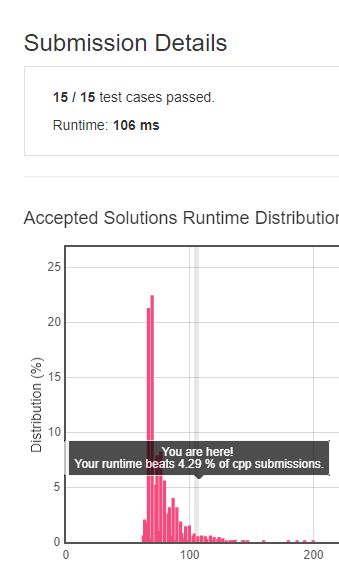- Nginx之ngx_http_proxy_connect_module模块
小米bb
Nginxnginxhttp运维
近期由于项目需要使用到https正向代理,而nginx官方模块仅支持做http正向代理,一番百度学习后发现了该模块,故今日记录下此笔记供大家一起学习交流ngx_http_proxy_connect_module模块主要用于隧道SSL请求的代理服务器GitHub地址:http://www.github.com/chobits/ngx_http_proxy_connect_modulenginx配置:
- FPGA器件在线配置方法概述
fpga和matlab
FPGA其他fpga开发FPGA在线配置
目录1.配置电路结构和原理2.ICR控制电路软件3.几种常见的FPGA在线配置方法3.1动态部分重配置(PartialReconfiguration,PR)3.2在系统编程(In-SystemProgramming,ISP)3.3多比特流配置(Multi-BitstreamConfiguration)3.4远程更新与配置3.5使用OpenCL或HLS工具FPGA(Field-Programmabl
- PIPE接口
奥特曼升级打怪兽
网络macos
nameDeswidthpipe的数据位宽2’b00:8bits(10bits)2’b01:16bits(20bits)2’b11:32bits(40bits)2’b11:保留(80bits)8/10b编码(128/130b编码)data并行数据(加扰)datak指示data为控制字符(gen1/gen2)valid有效接收/输出,表明data、datak上的Symbollock和有效数据data
- Leetcode.191.Number of 1 Bits
Jimmy木
题目给定一个无符号整数,求出其中二进制数中有多个1.Input:11(00000000000000000000000000001011)Output:3思路采用&运算,当(x&(10){intx=1<<i++;if((n&x)==x){n-=x;res++;}}returnres;}总结巧妙使用位运算,掌握位运算的使用场景.
- LeetCode笔记:717. 1-bit and 2-bit Characters
Cloudox_
问题(Easy):Wehavetwospecialcharacters.Thefirstcharactercanberepresentedbyonebit0.Thesecondcharactercanberepresentedbytwobits(10or11).Nowgivenastringrepresentedbyseveralbits.Returnwhetherthelastcharacter
- 【ShuQiHere】位(Bits)的表示与操作:从哲学启蒙到现代计算的跨越
ShuQiHere
算法计算机组成原理硬件架构
【ShuQiHere】引言:从数字哲学到计算机科学的演变✨自古希腊数学家毕达哥拉斯提出“万物皆数”的哲学主张以来,数字在科学、哲学及日常生活中扮演着重要角色。今天,数字更是计算机科学的基石。位(Bits),即二进制中的0和1,构成了所有现代计算的基础。本文将从历史文化背景出发,系统讲解位的表示与操作,揭示数字如何通过计算机实现信息处理,并详细探讨从古代数字系统到现代计算中的关键概念。1.数字与计算
- Flutter框架高阶——Window应用程序设置窗体窗口背景完全透明
木颤简叶
Flutterflutterwindows开发语言后端笔记c++microsoft
文章目录1.修改main.cpp1)C++与Win32API2)EnableTransparency()3)中文注释2.编写Flutter代码1)bitsdojo_window2)window_manager3)区别对比4)同时使用(1)设置初始化代码(2)处理冲突和集成Flutter的文件结构如下,找到图中的main.cpp的文件1.修改main.cppmain.cpp文件中的代码应该和下面差不
- QLoRa使用教程
云帆@
训练peft人工智能
一、定义定义案例1二、实现定义QLoRa:量化+LoRa.网址:https://huggingface.co/docs/peft/main/en/developer_guides/quantization案例11.4bit量化+LoRaimporttorchfromtransformersimportBitsAndBytesConfigconfig=BitsAndBytesConfig(load_
- mac 版本Jmeter安装教程
weixin_58693614
macosjmeterjava
1.确认是否安装JDK*打开终端->输入java-version(注意空格)会出现版本信息javaversion"16.0.1"2021-04-20Java(TM)SERuntimeEnvironment(build16.0.1+9-24)JavaHotSpot(TM)64-BitServerVM(build16.0.1+9-24,mixedmode,sharing)2.若没有安装,移步官网下载安
- FPGA随记——OSERDESE2和IERDESE2
一口一口吃成大V
FPGA随记fpga开发
http://t.csdnimg.cn/yNvxf---看这个篇吧这个挺好的OSERDESE2模块要求复位信号高电平有效,并且需要将异步复位信号同步到串行时钟域。除了用原语调用,还可以用HighSpeedSelectIOWizard这个IP进行调用针对具体selectIO这个IP的使用和介绍,参考这个文档:XilinxSelectIOIP使用说明(一)_selectiobitslip-CSDN博客
- 探索LangChain-Chatchat 0.3:一体化Agent与强大RAG模型的全面入门指南
爱喝白开水a
langchain人工智能aiai大模型大语言模型AgentRAG
介绍LangChain-Chatchat支持RAG和Agent0.3版本跟大模型解耦,支持Xinference、Ollama、LocalAI、FastChat、OneAPI,可以非常方便的切换各个模型,本文只是介绍XinferenceXorbitsInference(Xinference)是一个开源平台,用于简化各种AI模型的运行和集成。借助Xinference,您可以使用任何开源LLM、嵌入模型
- 搭建WebRTC服务器
音视频开发老马
音视频开发webrtc音视频
1、服务组成1、AppRTC房间服务,代码:github.com/webrtc/appr…2、Collider信令服务,AppRTC源码里自带3、CoTurn打洞服务,代码:github.com/coturn/cotu…打包资源:链接:pan.baidu.com/s/1ulx1FVRN…提取码:3e5f2、前期准备1、操作系统:Centos64bits2、Googlewebrtc的服务器Demo:
- IPFS学习笔记
Kevin_miu
IPFS区块链基础知识IPFS区块链
IPFS学习笔记文章目录IPFS学习笔记IPFS简介IPFS协议栈技术拆解1.Kademlia和DHT2.MerkleTree和MerkleDAG3.Bittorrent和BitSwap4.IPNS场景模拟版本:本文档持续更新…即将补充Bittorrent和MerkleDAG详细内容参考:戴嘉乐:详解IPFS的本质IPFS白皮书-JuanBenetP2P中DHT网络介绍IPFS:BitSwap协议
- 单片机原理及应用中断实验
hhappy0123456789
单片机嵌入式硬件
1.实验目的(1)熟悉51单片机中断初始化编程方法。(2)掌握51单片机外部中断源的设计使用。(3)中断处理应用程序的设计与调试技巧。2.实验内容通过对P3、2、P3、3引脚的电平控制,实现外部中断处理,从而控制输出口P1的输出效果变化。/用外中断0的中断方式进行数据采集与处理#include//包含51单片机寄存器定义的头文件sbitS=P3^2;//将S位定义为P3、2,/**********
- UNAVAILABLE_DURING_CALIBRATION
cckkppll
fpga开发
对于UltraScale体系结构,UNAVAILABLE_DURING_CALIBRATION属性禁用DRC错误消息,报告BITSLICE0在内置期间不可用自校准(BISC)过程。IDELAY/ODELAY和RX_BITSLICE/TX_ITSLICE/RXTX_ITSLICE支持时间模式DELAY_FORMAT通过连续调整对齐来提供更精确的延迟。当IDELAY/ODELAY和本机原语使用TIME
- verilog中 case写法避免写default的巧妙写法
Lambor_Ma
verilog数字
always@(*)beginout='1;//'1isaspecialliteralsyntaxforanumberwithallbitssetto1.//'0,'x,and'zarealsovalid.//Iprefertoassignadefaultvalueto'out'insteadofusinga//defaultcase.case(sel)4'h0:out=a;4'h1:out=b;
- Gambler
Alicesyuu
“Allmechanicalhabits,tastesandweaknessesfightagainstself-rememberinginman”~Gurdjieff「人裡面所有機械性的習慣、嗜好和軟弱,都在反對記得自己。」~葛吉夫图片发自App
- C# 教程 目录
VB.Net
C#教程C#教程
17.3图像处理17.3.1像素处理17.3.1.1逆反(底片)17.3.1.2曝光17.3.1.3灰度17.3.1.4浮雕17.3.1.5二值化(黑白)17.3.1.6自定义处理17.3.2内存处理17.3.2.1Bitmap.LockBits方法和Bitmap.UnlockBits方法17.3.2.2BitmapData类17.3.2.3逆反17.3.2.4曝光17.3.2.5灰度17.3.2
- Codeforces gym102423 - J One of Each(贪心 + 栈)
Happig丶
#
传送门题目大意给出nnn个数,仅包含[1,k][1,k][1,k]中的数,且至少含有kkk个不同的数。找到一个长度为kkk的子序列是kkk的一个排列且字典序最小。解题思路这个题算是比较难想的贪心了,而且要用栈维护。一开始用尺取发现维护不了,贪心的话自己又陷入了如下几个误区:如果从后向前贪心,显然是可以的,但是对于已经选过的数,无法得知前缀中待选的数是否能全部出现,即使bitsetbitsetbit
- ✌Linux Frame Buffer(Linux 底层的帧缓冲设备)
嵌入式小小聪
文件IOlinux
开发板的参数:芯片:三星S5P6818处理器:ARMCortex-A5364bitsOS:Linuxlcd屏幕:800*480LinuxFrameBuffer(Linux底层的帧缓冲设备)可以显示一帧一帧的图像(屏幕的显示)1.基本操作帧缓冲是Linux系统为显示设备提供的一个接口,把显示设备抽象成一个设备文件,它可以让上层的图像应用程序不需要关心具体的硬件实现细节,上层的图像应用程序只需要操作对
- Verilog刷题笔记54
十六追梦记
笔记fpga开发
题目:FsmserialdpSeealso:SerialreceiveranddatapathWewanttoaddparitycheckingtotheserialreceiver.Paritycheckingaddsoneextrabitaftereachdatabyte.Wewilluseoddparity,wherethenumberof1sinthe9bitsreceivedmustbe
- x86 32bits c && asm helloworld
dddddppppp123
linux运维服务器
helloworld:helloworld.omain.ogcc-m32-no-piehelloworld.omain.o-ohelloworld#ld-melf_i386-s-ohelloworldhelloworld.omain.ohelloworld.o:helloworld.asm#nasm-felf64-ohelloworld.ohelloworld.asmnasm-felf32-ohe
- 762. Prime Number of Set Bits in Binary Representation
Nancyberry
DescriptionGiventwointegersLandR,findthecountofnumbersintherange[L,R](inclusive)havingaprimenumberofsetbitsintheirbinaryrepresentation.(Recallthatthenumberofsetbitsanintegerhasisthenumberof1spresentwh
- leetcode颠倒二进制位
与遨游于天地
leetcode算法数据结构
publicclassSolution{//youneedtreatnasanunsignedvaluepublicintreverseBits(intn){if(n==0)returnn;inti=-1,m=0;while(++i>1;}returnm;}}
- HDLBits刷题Day23,3.2.5.7 Simple FSM 3 (asynchronous reset) - 3.2.5.8 Simple FSM 3 (synchronous reset)
weixin_52312830
HDLBits刷题fpga开发算法硬件工程
联系3.2.5.5和3.2.5.6来看3.2.5.7SimpleFSM3(asynchronousreset)问题描述下面是一输入一输出四状态的摩尔状态机的状态转移表。实现这个状态机。包括将FSM重置为状态A的异步重置。代码:moduletop_module(inputclk,inputin,inputareset,outputout);//reg[1:0]state,next_state;par
- C#,二进制数的非0位数统计(Bits Count)的算法与源代码
深度混淆
算法c#散列表SWAR
计算一个十进制数的二进制表示有多少位1?1遍历法(递归或非递归)使用循环按位统计1的个数。2哈希查表法利用一个数组或哈希生成一张表,存储不同二进制编码对应的值为1的二进制位数,那么在使用时,只需要去进行查询,即可在O(1)的时间复杂度内得到结果。但是,此算法有个弊端,由于算法是采用空间换取时间的方法,当一个二进制数的位长超过一定限度时,对应的表也就会占据很大的空间,也就是说节约时间越多,花费的存储
- 51单片机的I2c总线和AT24C16程序
广西小辉辉
51单片机C语言51单片机AT24C16I2C总线C程序
#include#defineucharunsignedcharsbitSDA=P2^0;sbitSCL=P2^1;voiddelay()//延时5us{;;}voiddelay_10ms()//延时{uchara,b;for(a=50;a>0;a–)for(b=200;b>0;b–);}voidstart()//起始信号{SDA=1;SCL=1;delay();SDA=0;delay();}vo
- 2021-06-12 One small step
春生阁
Microhabitsarethosesmallerstepsinourlifestylethatcanhelpusachievethemacrogoals.Overtheyearsofself-help,Ihaverealizedthatadoptingsomehealthymicrohabitscanhelpusformmacrohabitseffortlessly.Besides,fulfi
- 力扣_字符串8—不同的子序列
qweasdwxc
leetcode算法职场和发展
题目给你两个字符串sss和ttt,统计并返回在sss的子序列中ttt出现的个数,结果需要对109+710^9+7109+7取模。示例:输入:s=rabbbit,t=rabbits=rabbbit,t=rabbits=rabbbit,t=rabbit输出:333解释:如下所示,有3种可以从sss中得到rabbitrabbitrabbit的方案。rabbbitrabbbitrabbbit方法动态规划创
- 【c语言】旋转右移
「已注销」
笔记
c语言实现旋转右移题目请编写宏BIT_ROTATE_RIGHT(n,b),实现将无符号整数n循环右移(从右端移出的位再从左端移入)b个二进制位。代码实现typeofunitunsignedint;#defineUNIT_BITS(sizeof(unit)>BIT_REMINDER(b)|((uint)(n)<<(UINT_BITS-BIT_REMINDER(b))))BIT_REMINDER(b)
- 深入浅出Java Annotation(元注解和自定义注解)
Josh_Persistence
Java Annotation元注解自定义注解
一、基本概述
Annontation是Java5开始引入的新特征。中文名称一般叫注解。它提供了一种安全的类似注释的机制,用来将任何的信息或元数据(metadata)与程序元素(类、方法、成员变量等)进行关联。
更通俗的意思是为程序的元素(类、方法、成员变量)加上更直观更明了的说明,这些说明信息是与程序的业务逻辑无关,并且是供指定的工具或
- mysql优化特定类型的查询
annan211
java工作mysql
本节所介绍的查询优化的技巧都是和特定版本相关的,所以对于未来mysql的版本未必适用。
1 优化count查询
对于count这个函数的网上的大部分资料都是错误的或者是理解的都是一知半解的。在做优化之前我们先来看看
真正的count()函数的作用到底是什么。
count()是一个特殊的函数,有两种非常不同的作用,他可以统计某个列值的数量,也可以统计行数。
在统
- MAC下安装多版本JDK和切换几种方式
棋子chessman
jdk
环境:
MAC AIR,OS X 10.10,64位
历史:
过去 Mac 上的 Java 都是由 Apple 自己提供,只支持到 Java 6,并且OS X 10.7 开始系统并不自带(而是可选安装)(原自带的是1.6)。
后来 Apple 加入 OpenJDK 继续支持 Java 6,而 Java 7 将由 Oracle 负责提供。
在终端中输入jav
- javaScript (1)
Array_06
JavaScriptjava浏览器
JavaScript
1、运算符
运算符就是完成操作的一系列符号,它有七类: 赋值运算符(=,+=,-=,*=,/=,%=,<<=,>>=,|=,&=)、算术运算符(+,-,*,/,++,--,%)、比较运算符(>,<,<=,>=,==,===,!=,!==)、逻辑运算符(||,&&,!)、条件运算(?:)、位
- 国内顶级代码分享网站
袁潇含
javajdkoracle.netPHP
现在国内很多开源网站感觉都是为了利益而做的
当然利益是肯定的,否则谁也不会免费的去做网站
&
- Elasticsearch、MongoDB和Hadoop比较
随意而生
mongodbhadoop搜索引擎
IT界在过去几年中出现了一个有趣的现象。很多新的技术出现并立即拥抱了“大数据”。稍微老一点的技术也会将大数据添进自己的特性,避免落大部队太远,我们看到了不同技术之间的边际的模糊化。假如你有诸如Elasticsearch或者Solr这样的搜索引擎,它们存储着JSON文档,MongoDB存着JSON文档,或者一堆JSON文档存放在一个Hadoop集群的HDFS中。你可以使用这三种配
- mac os 系统科研软件总结
张亚雄
mac os
1.1 Microsoft Office for Mac 2011
大客户版,自行搜索。
1.2 Latex (MacTex):
系统环境:https://tug.org/mactex/
&nb
- Maven实战(四)生命周期
AdyZhang
maven
1. 三套生命周期 Maven拥有三套相互独立的生命周期,它们分别为clean,default和site。 每个生命周期包含一些阶段,这些阶段是有顺序的,并且后面的阶段依赖于前面的阶段,用户和Maven最直接的交互方式就是调用这些生命周期阶段。 以clean生命周期为例,它包含的阶段有pre-clean, clean 和 post
- Linux下Jenkins迁移
aijuans
Jenkins
1. 将Jenkins程序目录copy过去 源程序在/export/data/tomcatRoot/ofctest-jenkins.jd.com下面 tar -cvzf jenkins.tar.gz ofctest-jenkins.jd.com &
- request.getInputStream()只能获取一次的问题
ayaoxinchao
requestInputstream
问题:在使用HTTP协议实现应用间接口通信时,服务端读取客户端请求过来的数据,会用到request.getInputStream(),第一次读取的时候可以读取到数据,但是接下来的读取操作都读取不到数据
原因: 1. 一个InputStream对象在被读取完成后,将无法被再次读取,始终返回-1; 2. InputStream并没有实现reset方法(可以重
- 数据库SQL优化大总结之 百万级数据库优化方案
BigBird2012
SQL优化
网上关于SQL优化的教程很多,但是比较杂乱。近日有空整理了一下,写出来跟大家分享一下,其中有错误和不足的地方,还请大家纠正补充。
这篇文章我花费了大量的时间查找资料、修改、排版,希望大家阅读之后,感觉好的话推荐给更多的人,让更多的人看到、纠正以及补充。
1.对查询进行优化,要尽量避免全表扫描,首先应考虑在 where 及 order by 涉及的列上建立索引。
2.应尽量避免在 where
- jsonObject的使用
bijian1013
javajson
在项目中难免会用java处理json格式的数据,因此封装了一个JSONUtil工具类。
JSONUtil.java
package com.bijian.json.study;
import java.util.ArrayList;
import java.util.Date;
import java.util.HashMap;
- [Zookeeper学习笔记之六]Zookeeper源代码分析之Zookeeper.WatchRegistration
bit1129
zookeeper
Zookeeper类是Zookeeper提供给用户访问Zookeeper service的主要API,它包含了如下几个内部类
首先分析它的内部类,从WatchRegistration开始,为指定的znode path注册一个Watcher,
/**
* Register a watcher for a particular p
- 【Scala十三】Scala核心七:部分应用函数
bit1129
scala
何为部分应用函数?
Partially applied function: A function that’s used in an expression and that misses some of its arguments.For instance, if function f has type Int => Int => Int, then f and f(1) are p
- Tomcat Error listenerStart 终极大法
ronin47
tomcat
Tomcat报的错太含糊了,什么错都没报出来,只提示了Error listenerStart。为了调试,我们要获得更详细的日志。可以在WEB-INF/classes目录下新建一个文件叫logging.properties,内容如下
Java代码
handlers = org.apache.juli.FileHandler, java.util.logging.ConsoleHa
- 不用加减符号实现加减法
BrokenDreams
实现
今天有群友发了一个问题,要求不用加减符号(包括负号)来实现加减法。
分析一下,先看最简单的情况,假设1+1,按二进制算的话结果是10,可以看到从右往左的第一位变为0,第二位由于进位变为1。
- 读《研磨设计模式》-代码笔记-状态模式-State
bylijinnan
java设计模式
声明: 本文只为方便我个人查阅和理解,详细的分析以及源代码请移步 原作者的博客http://chjavach.iteye.com/
/*
当一个对象的内在状态改变时允许改变其行为,这个对象看起来像是改变了其类
状态模式主要解决的是当控制一个对象状态的条件表达式过于复杂时的情况
把状态的判断逻辑转移到表示不同状态的一系列类中,可以把复杂的判断逻辑简化
如果在
- CUDA程序block和thread超出硬件允许值时的异常
cherishLC
CUDA
调用CUDA的核函数时指定block 和 thread大小,该大小可以是dim3类型的(三维数组),只用一维时可以是usigned int型的。
以下程序验证了当block或thread大小超出硬件允许值时会产生异常!!!GPU根本不会执行运算!!!
所以验证结果的正确性很重要!!!
在VS中创建CUDA项目会有一个模板,里面有更详细的状态验证。
以下程序在K5000GPU上跑的。
- 诡异的超长时间GC问题定位
chenchao051
jvmcmsGChbaseswap
HBase的GC策略采用PawNew+CMS, 这是大众化的配置,ParNew经常会出现停顿时间特别长的情况,有时候甚至长到令人发指的地步,例如请看如下日志:
2012-10-17T05:54:54.293+0800: 739594.224: [GC 739606.508: [ParNew: 996800K->110720K(996800K), 178.8826900 secs] 3700
- maven环境快速搭建
daizj
安装mavne环境配置
一 下载maven
安装maven之前,要先安装jdk及配置JAVA_HOME环境变量。这个安装和配置java环境不用多说。
maven下载地址:http://maven.apache.org/download.html,目前最新的是这个apache-maven-3.2.5-bin.zip,然后解压在任意位置,最好地址中不要带中文字符,这个做java 的都知道,地址中出现中文会出现很多
- PHP网站安全,避免PHP网站受到攻击的方法
dcj3sjt126com
PHP
对于PHP网站安全主要存在这样几种攻击方式:1、命令注入(Command Injection)2、eval注入(Eval Injection)3、客户端脚本攻击(Script Insertion)4、跨网站脚本攻击(Cross Site Scripting, XSS)5、SQL注入攻击(SQL injection)6、跨网站请求伪造攻击(Cross Site Request Forgerie
- yii中给CGridView设置默认的排序根据时间倒序的方法
dcj3sjt126com
GridView
public function searchWithRelated() {
$criteria = new CDbCriteria;
$criteria->together = true; //without th
- Java集合对象和数组对象的转换
dyy_gusi
java集合
在开发中,我们经常需要将集合对象(List,Set)转换为数组对象,或者将数组对象转换为集合对象。Java提供了相互转换的工具,但是我们使用的时候需要注意,不能乱用滥用。
1、数组对象转换为集合对象
最暴力的方式是new一个集合对象,然后遍历数组,依次将数组中的元素放入到新的集合中,但是这样做显然过
- nginx同一主机部署多个应用
geeksun
nginx
近日有一需求,需要在一台主机上用nginx部署2个php应用,分别是wordpress和wiki,探索了半天,终于部署好了,下面把过程记录下来。
1. 在nginx下创建vhosts目录,用以放置vhost文件。
mkdir vhosts
2. 修改nginx.conf的配置, 在http节点增加下面内容设置,用来包含vhosts里的配置文件
#
- ubuntu添加admin权限的用户账号
hongtoushizi
ubuntuuseradd
ubuntu创建账号的方式通常用到两种:useradd 和adduser . 本人尝试了useradd方法,步骤如下:
1:useradd
使用useradd时,如果后面不加任何参数的话,如:sudo useradd sysadm 创建出来的用户将是默认的三无用户:无home directory ,无密码,无系统shell。
顾应该如下操作:
- 第五章 常用Lua开发库2-JSON库、编码转换、字符串处理
jinnianshilongnian
nginxlua
JSON库
在进行数据传输时JSON格式目前应用广泛,因此从Lua对象与JSON字符串之间相互转换是一个非常常见的功能;目前Lua也有几个JSON库,本人用过cjson、dkjson。其中cjson的语法严格(比如unicode \u0020\u7eaf),要求符合规范否则会解析失败(如\u002),而dkjson相对宽松,当然也可以通过修改cjson的源码来完成
- Spring定时器配置的两种实现方式OpenSymphony Quartz和java Timer详解
yaerfeng1989
timerquartz定时器
原创整理不易,转载请注明出处:Spring定时器配置的两种实现方式OpenSymphony Quartz和java Timer详解
代码下载地址:http://www.zuidaima.com/share/1772648445103104.htm
有两种流行Spring定时器配置:Java的Timer类和OpenSymphony的Quartz。
1.Java Timer定时
首先继承jav
- Linux下df与du两个命令的差别?
pda158
linux
一、df显示文件系统的使用情况,与du比較,就是更全盘化。 最经常使用的就是 df -T,显示文件系统的使用情况并显示文件系统的类型。 举比例如以下: [root@localhost ~]# df -T Filesystem Type &n
- [转]SQLite的工具类 ---- 通过反射把Cursor封装到VO对象
ctfzh
VOandroidsqlite反射Cursor
在写DAO层时,觉得从Cursor里一个一个的取出字段值再装到VO(值对象)里太麻烦了,就写了一个工具类,用到了反射,可以把查询记录的值装到对应的VO里,也可以生成该VO的List。
使用时需要注意:
考虑到Android的性能问题,VO没有使用Setter和Getter,而是直接用public的属性。
表中的字段名需要和VO的属性名一样,要是不一样就得在查询的SQL中
- 该学习笔记用到的Employee表
vipbooks
oraclesql工作
这是我在学习Oracle是用到的Employee表,在该笔记中用到的就是这张表,大家可以用它来学习和练习。
drop table Employee;
-- 员工信息表
create table Employee(
-- 员工编号
EmpNo number(3) primary key,
-- 姓


